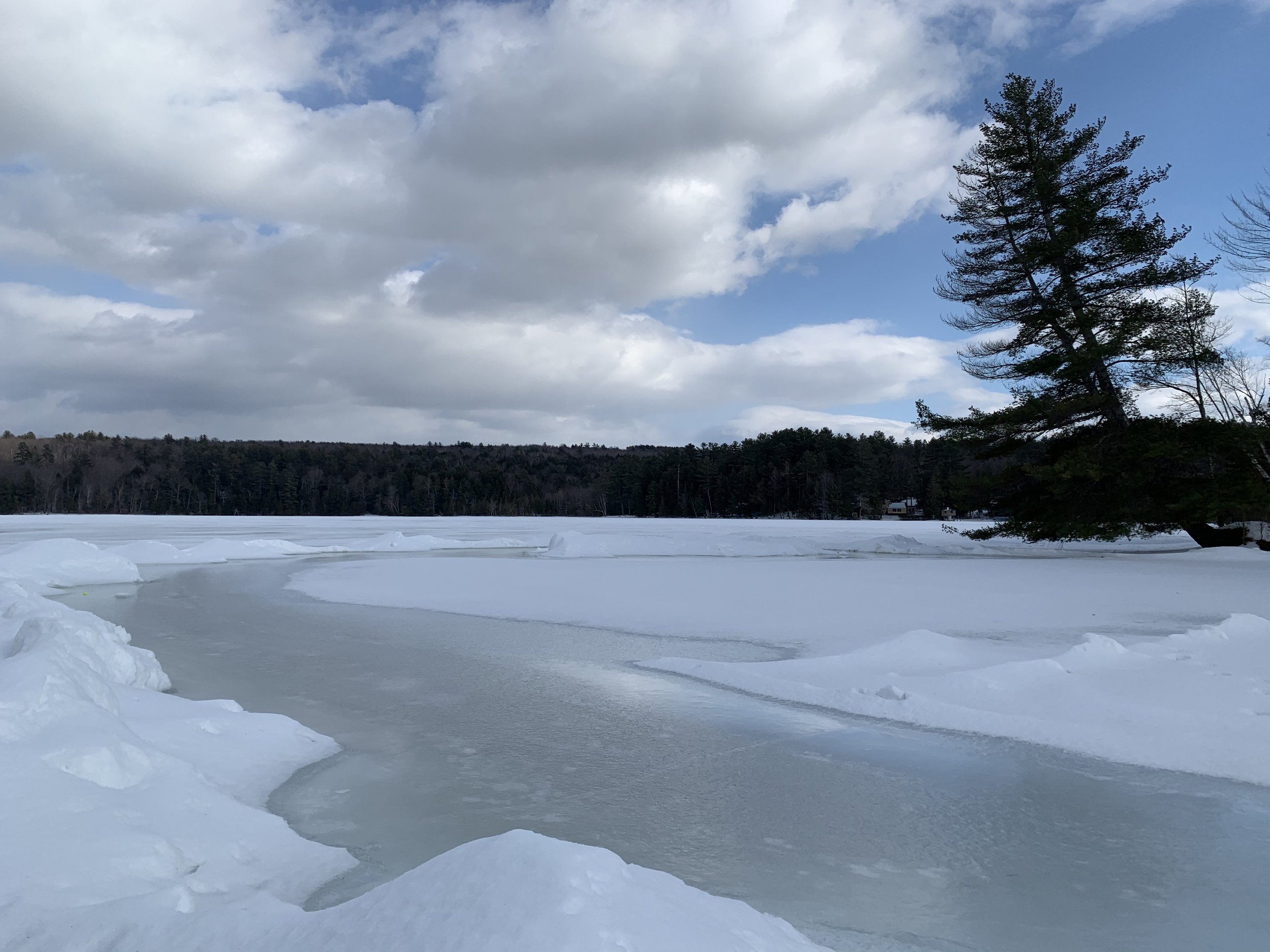Stratham, New Hampshire USA
It’s hard not to notice how much time we spend complaining about winter, avoiding it, or trying to escape it. (1) I’m thoroughly annoyed when a bomb cyclone pummels the East Coast and my yoga class gets cancelled. But it is also true that a raging blizzard bestows an object lesson on home, and therefore, “inside” practice; nature ordains that I stay put for a while and wait for conditions to change.
I revel in the storm watch, including impasses caused by blizzard conditions, and all the closings and cancellations. Winter storms have always excited and relaxed me at the same time. I do not see winter as a season that needs to be escaped, resisted, or endured. I value winter, not only for its beauty, but for the natural rhythm and resting period it provides for the earth. Winter’s slower pace permits intermission, retreat, and reflection- all of which are necessary for the transformation that comes in spring.
One way to practice active acceptance and stay in the present moment during the winter months is to take up outdoor walking meditations, a practice also known as forest bathing. Forest bathing, or Shinrin-Yoku (2), is a form of therapy developed by the Japanese. The benefits of Shinrin-Yoku are similar to those found in a physical yoga or in a sitting meditation practice with the added benefit of being outside.
Shinrin-Yoku is an immersive experience where one soaks in the natural environment quietly, without distraction. The technique was developed to alleviate the consequences of stress. It is well-proven that time spent in the great outdoors restores mental, physical and spiritual health.
Fayette, Maine, USA
Our brains need time to recharge. The demands of everyday life such as reading, social interactions, and time on electronic devices require “forced attention”, all of which result in “attention fatigue.” As necessary and entertaining as these activities may be, they deplete our brain’s batteries. Forest bathing allows the brain to relax and revive itself from prolonged periods of forced attention.
Phil Stieg, MD Ph.D. Chairman of Neurological Surgery and Neurosurgeon-in-Chief at New York Presbyterian/Weill Cornell Medical Center encourages his patients to take time out in nature. “Getting out in nature seems to relax the brain’s frontal lobes and relieve attention fatigue and stress.” (3)
Forest environments also increase human natural killer (NK) cell activity and the expression of anti-cancer proteins. (4,5,6) Evergreens, in particular, emit high concentrations of substances that protect them from bacteria, fungi, and insects. These organic compounds are called phytoncides. In addition to antimicrobial potency, several studies have uncovered the ability of phytoncides to increase NK cells that fight infections, cancers, and tumors in the human genome.
Stowe, Vermont USA 📸: Donata Random
Mental, physical, and spiritual benefits aside, I savor winter through daily walking meditation. Sometimes I bring a camera to capture the beauty I see, but I have also discovered that leaving the camera (and cell phone) behind changes the quality of my attention. Rather than engaging in the mental activity of “taking” pictures, I “turn off” the camera (and with it, my mind), creating greater receptivity to the moment.
The sharp, pale sky; towering Evergreen boughs, heavy with snowfall and the scent of balsam; the crackle and crunch under foot; tracks left by nocturnal fauna; the slide (instead of swim) across a hardened lake— this is the magic of winter’s jouissance. The brilliance, density, and magnitude of the stars on arid winter nights stir otherworldly questions, summoning the numinous. Winter is a hushed time for reverence— a time to let the impermanence of all things, and the cyclical quality of life and seasonal renewal, sink in. ~ Barbara Dugan 2022
1. If you aren’t a winter sport enthusiast, that is.
2. ”Shinrin” means forest and “Yoku” signifies bathing.
3. Heid, Markham, How ‘Soft Fascination’ Helps Restore Your Tired Brain, Elemental, June 16. 2021
4. Li Q, Morimoto K, Kobayashi M, Inagaki H, Katsumata M, Hirata Y, Hirata K, Shimizu T, Li YJ, Wakayama Y, Kawada T, Ohira T, Takayama N, Kagawa T, Miyazaki Y. "A forest bathing trip increases human natural killer activity and expression of anti-cancer proteins in female subjects." J Biol Regul Homeost Agents. 2008 Jan–Mar;22(1):45–55.
5. Q Li, M Kobayashi, Y Wakayama, H Inagaki, M Katsumata, Y Hirata, K Hirata, T Shimizu, T Kawada, B J Park, T Ohira, T Kagawa, Y Miyazaki Effect of phytoncide from trees on human natural killer cell function, Int J Immunopathol PharmacolOct-Dec 2009;22(4):951-9. doi: 10.1177/039463200902200410.
6. Li Q, Morimoto K, Kobayashi M, Inagaki H, Katsumata M, Hirata Y, Hirata K, Suzuki H, Li YJ, Wakayama Y, Kawada T, Park BJ, Ohira T, Matsui N, Kagawa T, Miyazaki Y, Krensky AM. "Visiting a forest, but not a city, increases human natural killer activity and expression of anti-cancer proteins." Int J Immunopathol Pharmacol. 2008 Jan–Mar;21(1):117–27.
Resources and Further Reading
The Nature Talks: www.thenaturetalks.com
Peter Wohlleben Website: https://www.peter-wohlleben.de/?set-culture=en Forrester and author of The Hidden Life of Trees ©2016, Wohlleben is a scientific pioneer who has made it his mission to testify to the importance of forests for human life.
Last child in the Woods by Richard Louv ©2006 Backed by research, Louv shows that direct exposure to nature is essential for healthy childhood development and a potent therapy for depression, obesity, and ADD. Louv also substantiates that education in natural settings dramatically improves skills in problem solving, critical thinking, creativity, and decision making.
Wintering by Katherine May ©2020 An exquisite personal account, May uses winter as an object lesson in active acceptance.


